'I will never teach anything but the truth': Meet the impassioned defiers of Florida's 'anti-woke' laws
A teacher, a writer and a historian present a small but determined community of resistance toward Republican Gov. Ron DeSantis’s culture war against “woke” ideology.
By Katharine Lake Berz Special to the Star
Saturday, March 30, 2024
Mayade Ersoff, 61, a middle school history teacher at her home in Miami. “I will never, ever, teach to the new standards,” she said.
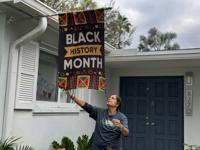
MIAMI — One day last September, history teacher Mayade Ersoff walked into her classroom at Palmetto Middle School, saw vandalism and vowed to resist.
A poster affirming that “Love is Love” still hung beside the blackboard. But two others, “Slavery did not Benefit Black People” and “Teach the Truth,” had vanished. In their place was a note from school principal Alina Valero asking to meet.
Ersoff is part of a small but determined community of resistance toward Republican Gov. Ron DeSantis’s culture war against “woke” ideology, a group that also includes a well-known gay Chilean-American writer and an 83-year-old retired Black professor.
The Teacher
She knew what was coming. In Principal Valero’s office, sun cascaded onto walls the colour of tropical waters, but the words were not sunny.
“I need to explain something to you,” Valero said. “You have to teach according to the new standards.”
In just two years, Florida has adopted policies that once seemed unthinkable: abortion outlawed six weeks after conception, transgender females barred from using women’s bathrooms, books about sexual orientation and race banned.
For Ersoff, 61, the changes opponents dubbed the “Slate of Hate” and “Don’t Say Gay” bar her from teaching that slavery harmed Black people and saying that anyone is oppressed based on their skin colour. Until a March 11 legal ruling that such rules exceed the bounds of the U.S. Constitution is clarified for teachers, she is not ever to discuss sexual orientation or gender. If a student’s preferred pronoun is different from their sex at birth, she is not to use it.
Instead, Ersoff must teach “how slaves developed skills which, in some instances, could be applied for their personal benefit.” She must say racial violence was perpetrated by and not only against African Americans. If a parent complains about a book, it will be banned.
As the principal’s words sounded, Ersoff grew tense.
Valero told her to sit down and listen. Ersoff remained standing. She spotted her confiscated signs on the office floor.
Her posters were small weapons in a lonely defiance. Most Sunshine State teachers were abiding by the new curriculum. One teacher at Palmetto, whose students are in Grades 6 to 8, was no longer teaching about the Holocaust for fear parents would complain. Others wouldn’t mention the Jan 6. 2021, attack on the U.S. Capitol. The school’s gay-straight alliance club had folded.
Movements to oust Florida’s “war on woke” are small in size but growing in influence, as some Floridians are alarmed by their state’s educational and social future.
While polls show that most Floridians still support DeSantis’ conservative leadership, unlikely alliances like Ersoff and her friends are waging a fierce resistance.
Ersoff could hear her students outside, playing under the swaying palms. Black children, white children. Children from China, Iran, Sweden and Chile.
She thought of these students growing up without knowing empathy or justice. Her sturdy frame was overwhelmed with grief and anger.
“I want my signs back,” she shouted, her gaze sharpening as it met the younger woman's eyes.
Ersoff strode forward, trembling with fury, glanced up at the security cameras watching her and snatched the signs.
“I will never, ever, teach to the new standards.”

Drawing by one of Mayade Ersoff’s U.S. history students at Palmetto Middle School in Miami, Florida. Ersoff says that children feel empowered by the truth. Katharine Lake Berz The Star
'I couldn’t believe it was actually true'
Teaching in Florida has never been easy for Ersoff.
Growing up in Baghdad, Iraq, in the late 1960s, with a Muslim father and a Christian mother, Ersoff longed for a world without inequity and anguish. Baghdad then was a thriving city with a complex ethnic and religious mix of Shia, Sunni and Kurds who were embracing western ideas. But it was an impoverished city, too, and one that turned on its 2,500-year-old Jewish community. When Ersoff was seven years old, more than a dozen men were hung in the town square and scores of others disappeared.
“There was poverty all around us,” she remembered with emotion. “We saw hangings on television.”
Ersoff immigrated to the United States as a young teen believing she had left suffering behind. She loved Burger King and studied journalism and education. She married Mayer Ersoff, a Jewish science teacher, and they raised two daughters.
But Ersoff soon learned that Florida has its own special form of suffering. She endured insults and discrimination for her Iraqi heritage. She was hit in the face by a mother who didn’t agree with her assessment of her son. One of her cherished students was accidentally shot dead by an older brother.
Still, when she first heard about Florida’s startling launch of bills targeting the Black and LGBTQ communities two years ago, Ersoff hadn’t believed it.
“I was in shock,” she said. “And then I felt disgust. I couldn’t believe it was actually true.”
But she wasn't alone.
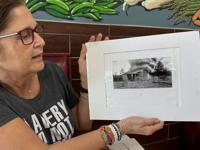
Mayade Ersoff with a photo of the Rosewood massacre where white mobs burned Black homes and killed almost all the Black townspeople in 1923. Katharine Lake Berz The Star
The Writer
Ersoff’s friend José Ignacio “Chascas” Valenzuela, a writer and screenwriter, shared her alarm over the new bills.
Valenzuela, 51, whose “Bad Love” trilogy are some of the bestselling young adult novels in the Spanish-speaking world, started writing to stand up to the oppression of what he calls the “black and white” dictatorship of the late Chilean president Augusto Pinochet.
Like Ersoff, Valenzuela has seen the darkest reaches of humanity. He grew up in Chile when more than 2,000 dissidents were tortured to death or executed, and nearly 1,500 disappeared. He was there when 200,000 Chileans were driven into exile. For half his life, same-sex love was a crime.
Valenzuela moved to Florida in 2014, a year when a sweeping majority of Miami voters supported a Democratic gubernatorial candidate. But life was still not easy for the outspoken LGBTQ activist.
The writer is known for using his stories to promote diversity and justice. His hit Netflix series, "Who Killed Sara?," was inspired by the discrimination he and his husband, Anthony Ortega, faced in their futile attempt to adopt a child in Florida, through characters Chema and Lorenzo.
“We were seen like pedophiles, like rapists,” he said of the couple’s four-year struggle. “They asked for three letters of recommendation, we gave them 10.” But even that wasn’t enough.
“It was heartbreaking.”
But then, with the election of DeSantis, it got worse.
After 10 years in Miami, Valenzuela was comfortable enough that at the outset, he thought Florida’s “Don’t Say Gay” law was impossible, just as his parents had believed Pinochet’s 1973 coup d’état was impossible a generation earlier.
“I thought: This is the United States, the land of freedom. This is the 21st century,” he said in an interview in the home he shares with Ortega and their four-year-old daughter, Leonora, whose birth came about with the help of a surrogate.
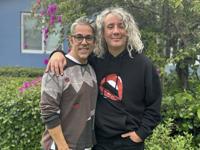
Anthony Ortega and José Ignacio Valenzuela in front of their Miami home. The couple has watched in horror as Gov. Ron DeSantis has made discrimination and hate acceptable in Florida, they said.
Katharine Lake Berz The Star
As Valenzuela spoke, Leonora bounced into the living room and clambered into his arms.
The writer celebrated Leonora’s arrival by creating a picture book.
But the book, "A Day with Papa and Dadda," an amusingly illustrated narrative that portrays the depth of his family’s love, cannot be found on school bookshelves in Florida.
“It is a very different Miami than it was even two years ago,” Valenzuela said.
The couple has watched in horror as DeSantis has made discrimination and hate acceptable in Florida, they said. The governor made it illegal for people to change the gender on their drivers’ licences but legal to carry a concealed handgun without a permit. Valenzuela and Ortega no longer go to the supermarket with Leonora together, fearing that a stranger with a hidden gun might shoot them.
“We think every day of leaving the state,” Ortega said. But close friends and family in Miami keep them there. And by staying, the couple proffer their own personal resistance in Florida’s culture wars.
Ortega fights the everyday injustices facing Miami’s same-sex parents. He calls for change tables in men’s bathrooms, family bathrooms and acceptance of men as primary caregivers. Valenzuela speaks out on his social media channels, explaining to anyone who will listen that their family is like any other.
They hope by teaching Leonora “the way they want the world to be” she will mount her own resistance. In Valenzuela’s new Netflix series, coming out in November, he will “explore the borders of complex families.” He is also writing another book for adults in which he expresses his aspirations for inclusivity and justice.
The Historian
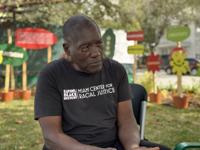
Marvin Dunn, a retired Florida International University professor, spends much of his time revealing forgotten Black lynchings to younger Floridians and speaking about the importance of teaching the truth.
As Valenzuela spoke, Leonora bounced into the living room and clambered into his arms.
The writer celebrated Leonora’s arrival by creating a picture book.
But the book, "A Day with Papa and Dadda," an amusingly illustrated narrative that portrays the depth of his family’s love, cannot be found on school bookshelves in Florida.
“It is a very different Miami than it was even two years ago,” Valenzuela said.
The couple has watched in horror as DeSantis has made discrimination and hate acceptable in Florida, they said. The governor made it illegal for people to change the gender on their drivers’ licences but legal to carry a concealed handgun without a permit. Valenzuela and Ortega no longer go to the supermarket with Leonora together, fearing that a stranger with a hidden gun might shoot them.
“We think every day of leaving the state,” Ortega said. But close friends and family in Miami keep them there. And by staying, the couple proffer their own personal resistance in Florida’s culture wars.
Ortega fights the everyday injustices facing Miami’s same-sex parents. He calls for change tables in men’s bathrooms, family bathrooms and acceptance of men as primary caregivers. Valenzuela speaks out on his social media channels, explaining to anyone who will listen that their family is like any other.
They hope by teaching Leonora “the way they want the world to be” she will mount her own resistance. In Valenzuela’s new Netflix series, coming out in November, he will “explore the borders of complex families.” He is also writing another book for adults in which he expresses his aspirations for inclusivity and justice.
The Historian

Marvin Dunn, a retired Florida International University professor, spends much of his time revealing forgotten Black lynchings to younger Floridians and speaking about the importance of teaching the truth.
Katharine Lake Berz The Star
Like Mayade Ersoff and many others, the couple is inspired by Marvin Dunn, a retired Florida International University professor. Dunn spends much of his time revealing forgotten Black lynchings to younger Floridians and speaking about the importance of teaching the truth.
“He is a force of nature,” Valenzuela said of Dunn. “In these dark times, we need his powerful educated voice.”
Dunn, 83, can be found most weekends in Miami’s impoverished Overtown neighbourhood — originally called Colored Town — tending to a garden. He tills the soil. He waters the produce. And he gives away books that the state has banned.
The garden, known as Teach the Truth Garden, spans a quarter of a city block on what was a vacant lot in Miami’s oldest Black community. Part fresh food bank, part center for racial justice, the park, which Dunn founded, blends harmonious rows of collard greens, tomatoes and parsley with inspirational placards whispering messages of hope and resilience.
On a recent Saturday in the garden, Dunn sat in the fragrant breeze surrounded by a small group of resisters.
An artist offered to paint a mural to honour Black history. A Jewish leader asked for help getting Holocaust education back into schools. A Black mother shared the grief of her 13-year old’s confrontation with a white boy who claimed that Blacks had profited from slavery.
“It’s only takes so many years before Black history is erased,” she lamented.
Visitors were given forbidden books to share, including the New York Times bestseller "The ABCs of Black History," by Rio Cortez, and Amanda Gorman’s "The Hill We Climb" Gorman’s book, the text of the poem she famously read at President Joe Biden’s 2021 inauguration, was banned in schools in Florida after a parent complained that it would confuse and indoctrinate children.
“I thought we were an exceptional country,” Dunn said. “And we’re not. We are just as vulnerable to dictatorships and to racism as any other country on the planet.
“I am seeing the breakdown in American democracy as I know it.”
'You need to know about this'
In early 2022, Ersoff invited Dunn to speak to her seventh-grade students about racism, something he had not done in years. The event was recorded.
At the start of his talk, Dunn held up a sign displayed on buses during his Miami childhood
Like Mayade Ersoff and many others, the couple is inspired by Marvin Dunn, a retired Florida International University professor. Dunn spends much of his time revealing forgotten Black lynchings to younger Floridians and speaking about the importance of teaching the truth.
“He is a force of nature,” Valenzuela said of Dunn. “In these dark times, we need his powerful educated voice.”
Dunn, 83, can be found most weekends in Miami’s impoverished Overtown neighbourhood — originally called Colored Town — tending to a garden. He tills the soil. He waters the produce. And he gives away books that the state has banned.
The garden, known as Teach the Truth Garden, spans a quarter of a city block on what was a vacant lot in Miami’s oldest Black community. Part fresh food bank, part center for racial justice, the park, which Dunn founded, blends harmonious rows of collard greens, tomatoes and parsley with inspirational placards whispering messages of hope and resilience.
On a recent Saturday in the garden, Dunn sat in the fragrant breeze surrounded by a small group of resisters.
An artist offered to paint a mural to honour Black history. A Jewish leader asked for help getting Holocaust education back into schools. A Black mother shared the grief of her 13-year old’s confrontation with a white boy who claimed that Blacks had profited from slavery.
“It’s only takes so many years before Black history is erased,” she lamented.
Visitors were given forbidden books to share, including the New York Times bestseller "The ABCs of Black History," by Rio Cortez, and Amanda Gorman’s "The Hill We Climb" Gorman’s book, the text of the poem she famously read at President Joe Biden’s 2021 inauguration, was banned in schools in Florida after a parent complained that it would confuse and indoctrinate children.
“I thought we were an exceptional country,” Dunn said. “And we’re not. We are just as vulnerable to dictatorships and to racism as any other country on the planet.
“I am seeing the breakdown in American democracy as I know it.”
'You need to know about this'
In early 2022, Ersoff invited Dunn to speak to her seventh-grade students about racism, something he had not done in years. The event was recorded.
At the start of his talk, Dunn held up a sign displayed on buses during his Miami childhood
“WHITES SEAT FROM FRONT. COLOURED SEAT FROM REAR.”
He asked the students how it made them feel.
“It makes me feel bad,” said an Hispanic boy.
“It feels unfair,” said an Asian-American girl.
Dunn told the students about his great-grandmother’s hands, scarred and crippled from a lifetime of picking cotton as a slave; how she never owned a pair of shoes or learned to read; how she ate with her hands out of a communal trough rife with diseases.
He revealed how his father’s home was bombarded by gunfire around election time and of stumbling across the roaring fire of a Ku Klux Klan meeting as a child. He recalled scavenging used books from the white school across town because his Black school was starved for resources.
Dunn's eyes glistened as he remembered being ejected from a Greyhound bus at age 16 on his way to accept a scholarship at Morehouse College, the country’s elite Black university in Atlanta, Ga. His only transgression had been his choice of a seat in the middle of the near-empty bus.
When he boarded the next bus, three hours later, he sat at the back.
As Dunn spoke, the children’s chins lifted from their desks and their eyes widened.
“You need to know about this,” Dunn said. “There’s a reason why we have so many poor Black people living in Overtown. That didn’t just happen. There’s a reason for that.”
In 2023, Dunn began “Teach the Truth” tours to reach more children and teachers. He now takes high school and college students, teachers and other interested people to Florida sites where Blacks were killed in racist attacks. One of these sites is Ocoee, in Central Florida, where 30 to 80 Black people were shot and lynched as a warning to other Black citizens who dared to vote in 1920.
At Rosewood, Dunn takes groups down a dusty dirt road to a wooded area he’s converting into a memorial park for the victims of another massacre. In 1923, white mobs burned Rosewood’s Black homes and killed almost all of the Black townspeople because of false allegations that a Black man had assaulted a white woman. None of the murderers were charged.
A year ago, Dunn visited the site with his son, Frederick. Suddenly a white neighbour with a “Desantisland” lawn sign charged at them in his Ford F-250 while yelling the n-word. Frederick leaped into the grass, saving himself by inches.
The confrontation has only encouraged Dunn to return and tell Rosewood’s story.
“I take kids and parents and grandparents and teachers to these places where blood was shed in Florida, so that not only can they know the facts of what happened but so that they can feel the history and relate to it emotionally,” Dunn said.
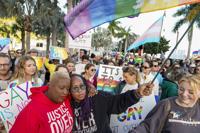
Florida House Representative Michele Rayner, left, hugs her spouse, Bianca Goolsby, during a march at city hall in St. Petersburg, Florida in March 2022, to protest the controversial "Don't say gay" bill.
He asked the students how it made them feel.
“It makes me feel bad,” said an Hispanic boy.
“It feels unfair,” said an Asian-American girl.
Dunn told the students about his great-grandmother’s hands, scarred and crippled from a lifetime of picking cotton as a slave; how she never owned a pair of shoes or learned to read; how she ate with her hands out of a communal trough rife with diseases.
He revealed how his father’s home was bombarded by gunfire around election time and of stumbling across the roaring fire of a Ku Klux Klan meeting as a child. He recalled scavenging used books from the white school across town because his Black school was starved for resources.
Dunn's eyes glistened as he remembered being ejected from a Greyhound bus at age 16 on his way to accept a scholarship at Morehouse College, the country’s elite Black university in Atlanta, Ga. His only transgression had been his choice of a seat in the middle of the near-empty bus.
When he boarded the next bus, three hours later, he sat at the back.
As Dunn spoke, the children’s chins lifted from their desks and their eyes widened.
“You need to know about this,” Dunn said. “There’s a reason why we have so many poor Black people living in Overtown. That didn’t just happen. There’s a reason for that.”
In 2023, Dunn began “Teach the Truth” tours to reach more children and teachers. He now takes high school and college students, teachers and other interested people to Florida sites where Blacks were killed in racist attacks. One of these sites is Ocoee, in Central Florida, where 30 to 80 Black people were shot and lynched as a warning to other Black citizens who dared to vote in 1920.
At Rosewood, Dunn takes groups down a dusty dirt road to a wooded area he’s converting into a memorial park for the victims of another massacre. In 1923, white mobs burned Rosewood’s Black homes and killed almost all of the Black townspeople because of false allegations that a Black man had assaulted a white woman. None of the murderers were charged.
A year ago, Dunn visited the site with his son, Frederick. Suddenly a white neighbour with a “Desantisland” lawn sign charged at them in his Ford F-250 while yelling the n-word. Frederick leaped into the grass, saving himself by inches.
The confrontation has only encouraged Dunn to return and tell Rosewood’s story.
“I take kids and parents and grandparents and teachers to these places where blood was shed in Florida, so that not only can they know the facts of what happened but so that they can feel the history and relate to it emotionally,” Dunn said.

Florida House Representative Michele Rayner, left, hugs her spouse, Bianca Goolsby, during a march at city hall in St. Petersburg, Florida in March 2022, to protest the controversial "Don't say gay" bill.
Martha Asencio-Rhine AP The Star
'I will never, ever teach anything but the truth'
Mayade Ersoff had decided to put those signs up in her classroom after taking Dunn’s “Teach the Truth” tour herself. She saw how teenagers who had lived their whole lives in Ocoee had not heard of the violence against their Black community a hundred years earlier. She saw, too, how empowered the children felt with the truth in their hearts.
Ersoff takes comfort from being part of a movement standing up for the truth; a small band of resisters including Valenzuela and Dunn. She has put the forbidden posters back up in her classroom. They are out of view from the hallway, but in full view of the students.
“I wasn’t hired to teach lies,” she said. “I will never, ever teach anything but the truth.” Ersoff will not teach “both sides” of massacres. She will not exclude stories about same-sex families. She will call children by the names and genders they ask her to call them.
Ersoff asked Dunn to speak at Palmetto again this February. Not all her students received permission from their parents to attend. But others asked why Florida lawmakers don’t want them to learn the truth about Black history.
She asked the children what they learned from Dunn, just as she had two years earlier, and found the hope she needed to go on.
“We need to listen to each other,” said a white girl.
“Why can’t we just come together and work it out?”

'I will never, ever teach anything but the truth'
Mayade Ersoff had decided to put those signs up in her classroom after taking Dunn’s “Teach the Truth” tour herself. She saw how teenagers who had lived their whole lives in Ocoee had not heard of the violence against their Black community a hundred years earlier. She saw, too, how empowered the children felt with the truth in their hearts.
Ersoff takes comfort from being part of a movement standing up for the truth; a small band of resisters including Valenzuela and Dunn. She has put the forbidden posters back up in her classroom. They are out of view from the hallway, but in full view of the students.
“I wasn’t hired to teach lies,” she said. “I will never, ever teach anything but the truth.” Ersoff will not teach “both sides” of massacres. She will not exclude stories about same-sex families. She will call children by the names and genders they ask her to call them.
Ersoff asked Dunn to speak at Palmetto again this February. Not all her students received permission from their parents to attend. But others asked why Florida lawmakers don’t want them to learn the truth about Black history.
She asked the children what they learned from Dunn, just as she had two years earlier, and found the hope she needed to go on.
“We need to listen to each other,” said a white girl.
“Why can’t we just come together and work it out?”

EXPLAINER: The power and appeal of Florida Gov. Ron DeSantis
After a shaky start to his 2024 U.S. Presidential bid on Twitter, Florida Gov. Ron DeSantis is working hard to convince American voters that he — not Donald Trump — is the best bet for Republicans to retake the White House. Katie Simpson tours Florida to get a better sense of the power and popularity of the man whose “anti-woke”...
Katharine Lake Berz is a freelance writer and frequent contributor to the Toronto Star who lives on Vancouver Island and in Toronto. Her work focuses on national and international issues and their impact on individuals.
After a shaky start to his 2024 U.S. Presidential bid on Twitter, Florida Gov. Ron DeSantis is working hard to convince American voters that he — not Donald Trump — is the best bet for Republicans to retake the White House. Katie Simpson tours Florida to get a better sense of the power and popularity of the man whose “anti-woke”...
Katharine Lake Berz is a freelance writer and frequent contributor to the Toronto Star who lives on Vancouver Island and in Toronto. Her work focuses on national and international issues and their impact on individuals.

No comments:
Post a Comment